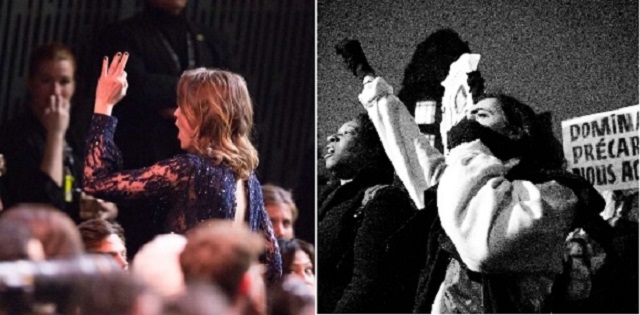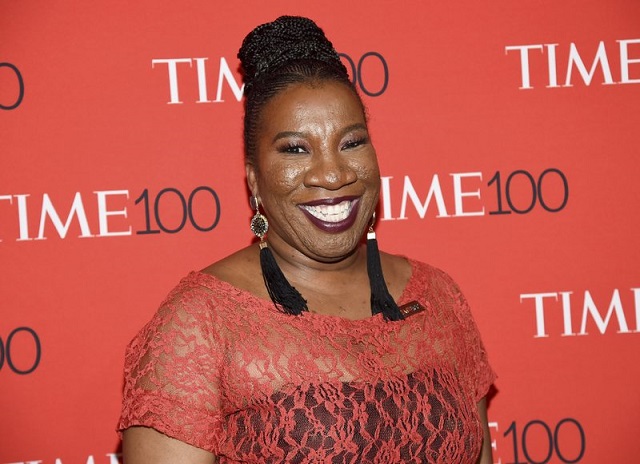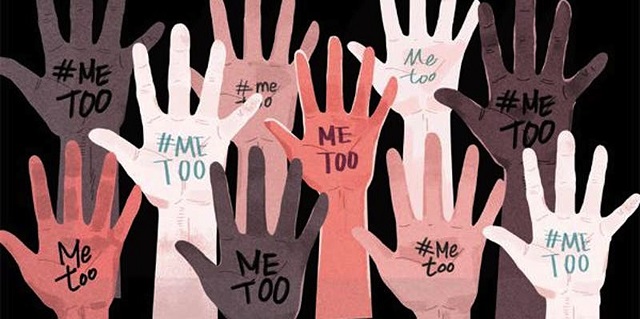Weinstein, Polanski and beyond: The ripening fruits of #MeToo Comment
New in Ceasefire, Politics - Posted on Wednesday, March 4, 2020 5:11 - 1 Comment

Paris, Feb 28, 2020: French actresses walk out (Left) while protesters chant outside the Césars awards ceremony (right, photo credit: Clara Dalmasso on instagram: @ladameenoir).
This past week, Paris and New York presented a tale of two cities. Disgraced movie mogul Harvey Weinstein was convicted of multiple counts of rape at a court in New York on February 24th and has since been arrested in Los Angeles to face further charges for rape and sexual battery taking place in California. In striking contrast, Roman Polanski won the Best Director award at the Césars awards ceremony (the French equivalent of The Oscars) for his rendering of the ‘Dreyfus affair’ in J’Accuse (“I Accuse”).
In response to Polanski’s win, Portrait of A Woman on Fire actress Adèle Haenel, alongside the film’s director, Celine Sciamma, staged a walked out, leading to more of the cast and crew following suit. “Congratulations to the pedophile!” Haenel exclaimed as she exited the building, mock-clapping the jury’s decision to honour Polanski, a man who has admitted anally raping a 13-year-old girl, amongst other accusations of rape. The bold feminist protest outside The César award ceremony captured the sentiment of women’s rage that an unrepentant rapist, a man who had fled the United States to France in order to escape legal accountability, was being celebrated so publicly. Their protest took place against the backdrop of a memorandum by French President Emmanuel Macron banning large public gatherings, such as mass demonstrations, under the guise of stopping the spread of covid19 (the coronavirus).
Awarding Polanski has a particular sting because J’Accuse has been partly pitched by Polanski as a parallel to his own life: that of a man unjustly accused. Polanski’s friend Quentin Tarantino similarly made several mitigating references to Polanski’s ‘pedocriminality’ (“he looks like a 12 year old boy”) in his latest film Once Upon A Time in Hollywood. This apologism was driven by the fact Tarantino himself has been reproached for comments he made justifying Polanski’s drugging and raping of a child. Both directors are examples of men using art to cover their own backs. Weinstein’s wholly unoriginal approach of mitigation was turning up to his trial with a zimmer frame, presenting himself as a feeble aging husk, rather than the hulking brutish man his victims describe (when he was arrested in Los Angeles days later, he was unsurprisingly sans zimmer frame). These men are invested in distorting their own predation and, to that end, engage in all forms of victim-blaming, because they wish to disguise from the world the injury their actions have caused an untold number of women and girls.
Undoubtedly, the MeToo movement has shifted public consensus around male sexual violence in the last half decade, thanks to the bravery of women speaking out about their own experiences. This 2013 article epitomises the narratives produced previously that regularly obfuscated recognition of the suffering and trauma that sexual assault can cause, arguing that punishments for male violence should be measured against the abusive man’s own suffering. Today, such a line of argument would unlikely to find a platform in the Guardian, though it remains a sad truth that violence against women is still downplayed despite its ongoing prevalence (the scale of which has led the UN to classify it as an epidemic).
MeToo is essentially a window into women’s lives. A window that has become increasingly less opaque over the last few years, as more women’s stories of sexual abuse were spotlighted in the press. Many of the stories of sexual harassment and rape by men have centred around high profile figures, precisely because powerful and famous men are already of interest to the public and so their victims’ MeToo stories more easily made their way into the coverage.

Tarana Burke
It was, in fact, Tarana Burke who coined the phrase “me too” in 1997, literally saying it in response to a young girl telling Burke of her own sexual abuse at the hands of her mother’s boyfriend. Burke’s response — “me too” — monumentally signified not only acknowledgement and belief in the girl’s account, but that it resonated as a shared experience. It is these common experiences of women, that we have almost all been sexually targeted by men — whether in the form of harassment on the street, domestic abuse inside the home, sent graphic pornographic images online, etc. — that allows us to recognise, once spoken aloud, our shared social position within society’s sexual hierarchy. This simple phrase, “me too”, does in two words the same work which consciousness-raising groups of the 1970s sought to achieve: recognising what, as women, we are subject to, as a sexual class, at the hands of men, as a class.
One of the criticisms of the Hollywood actresses raped by Weinstein and other powerful showbiz men like Bill Cosby, is that they are overwhelmingly ‘privileged’ individuals, occupying the highest rungs available on the social ladder for women. Indeed, these sexual violence victims are overwhelmingly white, wealthy, and heterosexual (with the notable exceptions of Lupita Nyong’o who was one of the first to speak out against Weinstein, as well as Andrea Constand whose testimony put Bill Cosby in prison). But does their social status not in fact make the opposite point? That being treated as a disposable, raped sexual object is the ceiling for women everywhere? Given this is what happens to you even if/when you do make it to the top of the woman hierarchy, does the top branch on the woman tree really seem so wonderful?
But there is an identifiable point of limitation surrounding the prevalence of MeToo in the world of work. MeToo must cross over into the world of heterosexual dynamics, beyond the workplace and into the sphere of romantic relationships (as it did for comedian Aziz Ansari when a woman detailed a date with the comic where he pressured her into various sexual acts at his home). MeToo must become an analysis and exposure of the entire unequal gendered sociality that exists between men and women; otherwise it will be hampered by the same ideology it is trying to fight. Take the aforementioned example of Aziz Ansari. It is often asked, “why didn’t she just leave?” with many not understanding the obvious answer: it was late at night and whilst there was one dangerous man indoors with her, who knows how many might be outside. The abiding factor here is fear of men.

The emphasis on a victim’s decision making, how they choose to handle the sexual abuse against them, was brought up by Weinstein’s defence during his trial: why did the raped women stay in contact with him? Often thanking him for support, sending courteous emails, even invitations to theatre shows they performed in? For the prosecution, Dr. Baravra Ziv spent time unpicking what she calls ‘rape myths’, pointing out that it is far from unusual for victims to stay in touch with men who assault them for a range of reasons, but the same determining factor is clear again: fear. These women already knew that Weinstein was a dangerous, violent predator because he proved it personally in devastating fashion. By glossing over his violence against them they hoped to smooth the situation, from one of violent encounter towards a more benign one. It is a bit like backing slowly away from a lion – you do not want to act like prey in front of a predator who has already shown it is willing to attack you.
In these scenarios, women are often required to play both hostage and hostage negotiator in our own lives. Negotiating escape and future safety simultaneously often entails ‘being friendly’ as a way of performing compliance toward the person you fear will harm you. Women generally cannot physically overpower men, and so alternate methods of limiting risk are required, such as placating an abuser with ‘niceness’ (being submissive). It may well seem contradictory, because it is, but this is the terrain set up for us to navigate; it is a universe designed to entrap and limit our freedoms – it is confusing and contradictory (though rarely is the austere contradiction of a married man beating the wife he supposedly loves pointed out). But despite the myriad of tensions, the one observable straightforward thread through this landscape is the fear men, as a class, impose on women (not all men have to rape women for all women to fear being raped).
It is good that Weinstein is facing consequences for his actions — something most men never experience, with rape prosecutions within the UK falling by 51% over the past five years. Whilst the law does not deliver justice most of the time, it is down to the women’s movement to fight for it. The feminists who protested Polanski outside The César awards, and the actresses who walked out from the ceremony, are all part of the same radical approach: until there are real repercussions and social consequences for men who violate women, the fightback will continue. Weinstein’s imprisonment may operate as a warning to powerful men who, until now, thought they could rape with total impunity, but until men, as a class, understand and fear the consequences of committing rape, the women’s movement has a considerable challenge to take up.



Nice content and any form of sexual abuse must not be tolerated.